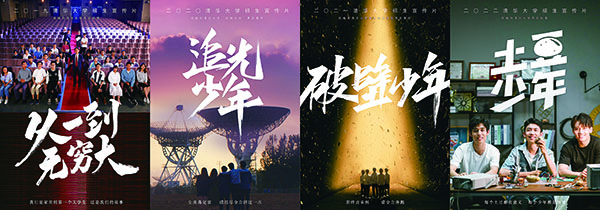

In the technological and ever-changing world of today, Di Di, a director based in Beijing, says that everyone has the ability to be a storyteller, Madeleine King reports.
We live in the digital era. People today have many platforms and resources to create their own content. Meanwhile, they are always hungry for new information and stories. And this requires more and more storytellers like Di Di.
Di Di is a Chinese director and producer. Through the media company he founded, the 29-year-old makes advertising and promotional videos, including those for Tsinghua University in Beijing, his alma mater and one of China's most prestigious universities.
With nearly ten years of directing experience under his belt, you might think he happily resides in the ivory tower of directing, but in fact, he has a very down-to-earth philosophy. "In today's video-content-centered world, everyone has the ability to be a director and share people's stories," he said. "This bottom-up model has enriched our society, and many directors have emerged this way, possessing no prior training."
Di's own somewhat accidental path to becoming a director serves as a perfect example. Majoring in journalism in his undergraduate degree at Tsinghua, he got into making films for a student association and then the university as a whole. One year, when asked to create a plan for the Tsinghua admissions promotional video, he couldn't find a director to fit the school's budget.
"I ended up directing the video myself. I really enjoyed the process of being creative and working with a team," he said.
In 2019, after graduating with a master's degree from Tsinghua, Di got a job in the corporate world but still engaged in directing projects in his spare time.
Creating an impactful university promotional video requires a lot more than just filming its famous landmarks, noted Di. "We need to demonstrate its real essence and spirit."
For the university's 2020 promotional video, Di came up with a unique plot. With the arrival of the COVID-19 pandemic in 2020, the Ministry of Education announced that that year's college entrance examination would be postponed for one month. Di created a story of a group of students aiming to launch their own satellite after facing a sudden setback before the launch date. "We have spent more than two years on this. Now with one month left, no one knows how it will turn out. But before the dust settles, I want to go all out this time," said the leader of the student team in the 8-minute-long video called Ignite. It served as a metaphor for the students preparing for the college entrance exam, encouraging them to keep fighting for one more month, and also capturing the hardworking and trailblazing academic spirit of Tsinghua University at the same time.
And in this endeavor, Di also found inspiration. "This video made me rethink my own career: Whether to continue working hard in the corporate world or stay true to myself and create more stories about Chinese young people. I think you can guess which road I chose," he said.
Looking at Di's resume, you'd think there is no one better for the job than he as the teller of Tsinghua's stories. Studying and growing up in Tsinghua, he immersed himself in the campus culture, and even did his master's thesis on how to present university culture in promotional videos at the University's Institute of Education.
But knowing about something is not enough to be able to successfully transmit that knowledge, said Di. He added that telling stories of the world of education well requires the use of narrative skills. For example, creating a unique scenario, arranging interviews and other special additions to bring it to life.
"I think the most important thing for a director is the ability to tell a story," he said. "Much of this ability is innate, and many directors describe it as a 'natural desire'."
But time can't stand still. After graduating, Di can no longer frequent the campus' dormitories, classrooms and canteens on a daily basis, and this means he needs to make an extra effort to stay in touch with the campus world he wants to share. "Directors can't shut themselves away from society," he said.